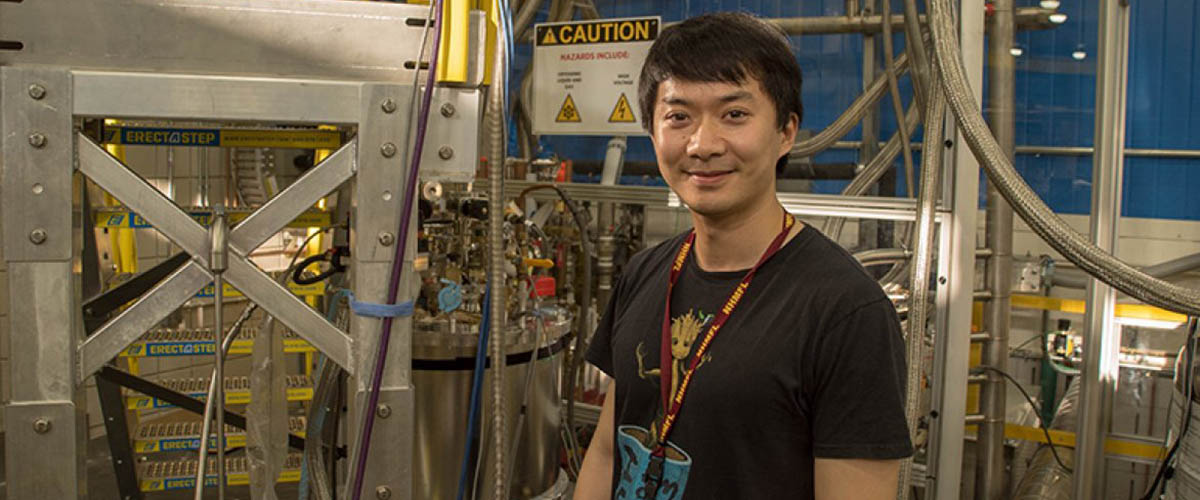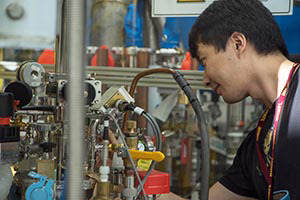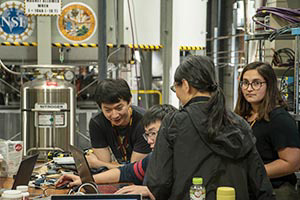
Stephen Bilenky
This frequent MagLab visitor talks about the allure of sci-fi, the road not taken as an engineer, and how he acts like a scientist, even when he’s off the clock.
Jia (Leo) Li, a postdoctoral researcher in physics at Columbia University, is a veteran MagLab user — he has visited nearly 20 times to work with our world-record magnets! Li currently works in Cory Dean's group at Columbia, but is slated to start his own group at Brown University next year. Though he frequents the lab and was one of the first users to do an experiment using the lab’s recently commissioned 36-tesla Series Connected Hybrid magnet, we wanted to learn more about him as a person. So we met up with Leo during a break in his research (on exotic states in double-layer graphene), to ask him some hard-hitting questions. Read how Li handled the pressure below.

Li adjusts equipment at the series connected hybrid magnet.
When you were younger, what did you want to be when you grow up?
A scientist.
When was the earliest memory of you wanting to be a scientist?
Pretty early — I guess elementary school. Scientists seemed very cool. They do cool stuff.
Did you know what type of scientist you wanted to be?
That memory is pretty vague, but I know in middle school I wanted to do physics. You know, when you apply a force and something moves, and if you don't apply any force it keeps moving forever — it's mesmerizing.
When was the first time you thought of yourself as a scientist?
That gets a little tricky. I keep thinking of myself as a scientist, but then later I feel like I question that definition a bit…
So then what is your definition of "scientist"?
[As a scientist] I should know enough that my activity expands the knowledge of nature or physics of human beings. That's a pretty high bar. Very often I question whether I am capable of doing that — pushing the frontier forward, even by just a tiny, little bit.
Who is your favorite scientist?
[Lev] Landau. Whatever I study, he seems to have written a book about it 100 years ago, or 50 years ago.

Li (far left) and other members of Cory Dean’s research group conduct an experiment on graphene.
If you weren’t a scientist, what would you be?
I guess I could be an engineer—a solid state-related engineer, who plays with materials. There are actually a lot of things seen in sci-fi that only engineers can do. Physicists study the fundamentals, and the engineers examine the facts and think, "Hmm, we can do something really cool with this new physics." For example, using superconductivity to implement a quantum computer. That's now blurring the lines between physics and engineer. But if you really say, "You can't be a physicist anymore," I could be happy doing that.
Have you used your science super powers outside the lab, in everyday life?
I'd say yes. If you ask my wife, she'd say definitely, yes — because I repair stuff.
What is your favorite book?
Apart from physics books? Sci-fi stories, like Asimov's Foundation. There is also a new sci-fi series by a Chinese writer, who is really good. President Obama actually commented on those books — he likes Cixin Liu.
Do you have a tattoo? If you were to get a tattoo, what would it be of?
I do not. I can never come to a conclusion, which is why I do not. There are so many different choices, but most of them are too nerdy.
To learn more about Li and his research.
By Abigail Engleman
More than 1,400 scientists come from across the world to use our unique magnets. If you have an experiment you would like to do here, find out how to request magnet time. Magnet time is free.
Last modified on 31 December 2022